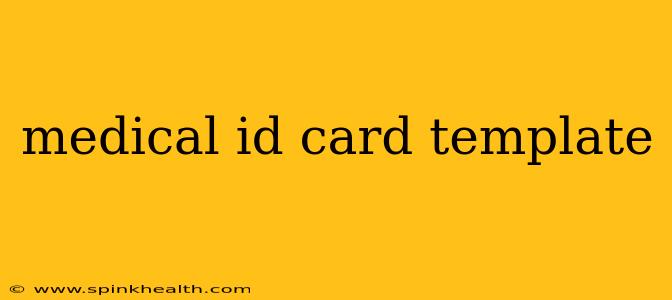Losing consciousness or being unable to communicate during a medical emergency is a terrifying prospect. This is where a medical ID card steps in, acting as a silent guardian, providing crucial information to first responders and medical professionals when you can't speak for yourself. But with so many options available, how do you choose the right medical ID card template and create one that truly protects you? Let's delve into this vital topic.
What Information Should Be Included on a Medical ID Card?
This is the most crucial aspect. Your medical ID card should be concise yet comprehensive. Think of it as a lifeline, conveying essential details quickly. Here’s what to include:
- Your Full Name: Seems obvious, but accuracy is key.
- Date of Birth: Helps avoid confusion and confirms identity.
- Allergies: List any life-threatening allergies, specifying the reaction. For example, "Penicillin - Anaphylaxis."
- Medical Conditions: Include chronic conditions like diabetes, heart conditions, epilepsy, etc. Again, be specific.
- Medications: List current medications and dosages. You may want to use abbreviations like "metformin 500mg BID."
- Emergency Contacts: Include at least two emergency contacts with their phone numbers.
- Blood Type (if known): This can be life-saving in severe blood loss situations.
- Physician's Name and Contact Information (optional but helpful): This allows first responders to quickly contact your doctor for additional information.
Where Can I Find Medical ID Card Templates?
Many resources offer customizable medical ID card templates. You can find them through several avenues:
- Online Template Websites: Numerous websites offer free and paid medical ID card templates in various formats (PDF, Word, etc.). Search for "medical ID card template" to find many options. Be sure to check reviews before using any site.
- Medical Supply Stores: Some medical supply stores might offer pre-printed medical ID cards or templates you can customize.
Remember, the best template is one that's easy to read, clear, and durable. Consider using high-quality card stock or laminating your printed card for extra protection.
What are the Different Types of Medical ID Cards?
The physical form of your medical ID card can also vary:
- Traditional Card: This is the most common type – a small card you carry in your wallet or purse.
- Digital Medical ID: Several apps now allow you to store medical information digitally. This is an excellent supplement to a physical card, but remember your phone may not always be accessible in an emergency.
- Medical Alert Bracelets or Necklaces: This provides a constant, visible reminder of your medical needs.
How Do I Choose the Right Medical ID Card Template for My Needs?
The best template depends on your individual needs and preferences. Consider these factors:
- Ease of Use: Can you easily customize the template with your information?
- Clarity and Readability: Is the font size large enough to be easily read by emergency personnel?
- Durability: Will the material withstand daily wear and tear?
- Privacy: Some templates offer more privacy features than others.
Can I Use a DIY Medical ID Card Template?
Absolutely! Many free templates are available online. However, remember to be meticulous with the information you add and always prioritize clarity and accuracy.
What is the Best Material for a Medical ID Card?
Durability is key. While paper is easy to work with for DIY templates, consider using a waterproof, tear-resistant material, such as a laminated card. This ensures your information remains readable even if the card gets wet or damaged.
How Can I Keep My Medical Information Up-to-Date?
Your medical information changes, so regular updates are crucial. Review and update your medical ID card at least annually, or whenever there are significant changes to your health information or medications.
In conclusion, a well-designed medical ID card is a powerful tool that can provide peace of mind in emergency situations. By carefully selecting a template and including accurate, essential information, you can ensure first responders have the critical data they need to provide you with the best possible care. Don't delay—create your medical ID card today.

